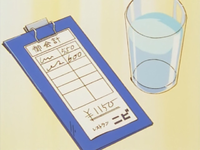Pokémon Dollar
Pokémon Dollar (Japanese: ポケドル Pokédollar) is the main currency used in most known regions of the Pokémon world. Its symbol is $, a P with a double strikethrough, similar to the ¥ symbol used for Japanese yen or the € symbol used for euro, with the P symbol referring to Pokémon.
The Pokémon Dollar and its symbol were both created for the English translation of the games. In the original Japanese versions (except for Colosseum and XD), the currency used is yen and the symbol used is 円, the kanji for yen. As such, the Pokémon Dollar is based on yen.
Also, much like the yen, the cost of simple items runs in the hundreds—indeed, most items have prices that are multiples of 100 or 1000.
Icon
| File:PokémonDollar III.png | ||
|
I-II |
III-IV |
V |
Acquisition
Pokémon Dollars are acquired primarily by defeating Pokémon Trainers in battle, or by selling items at a Poké Mart. Pokémon Dollars can also be acquired by using the move Pay Day in battle, at the rate of either 2 or 5 times the level of the Pokémon using it, depending on the generation. Pokémon Black and White introduce the concept of item maniacs. Item maniacs are NPCs who will pay large sums of money for certain items, most of which have no other use but to be sold to these people.
Storage
In the handheld Pokémon games before Pokémon Black and White, a player's wallet can hold only up to $999,999. This may cause frustration when trying to save up for the advertised price of a Bicycle in Generation I (and its Generation III remakes) or a SlowpokeTail on Route 32 in Generation II (and its Generation IV remakes), since both are advertised for $1 more than the player can carry. The GameCube, Generation V and Generation VI games allow players to carry up to $9,999,999.
Other currencies
- Main article: Category:Currency
Coins are utilized to play the various games of the Game Corners throughout the Pokémon world, as well as to obtain and collect the various Game Corner prizes available.
Battle Points (introduced in Pokémon Emerald) are used as currency in numerous battling facilities, such as the Battle Frontiers of Hoenn and Sinnoh/Johto, as well as the Battle Subway, Pokémon World Tournament, and the Battle Maison, the former two both being in Unova, and the latter being in Kalos.
Mt. Battle and Pokétopia use Poké Coupons as their currency; due to both of these locations being battle facilities, they are analogous to Battle Points.
The Pokémon Mystery Dungeon world used Poké as its sole form of currency up until Pokémon Mystery Dungeon: Gates to Infinity. In Pokémon Mystery Dungeon: Gates to Infinity, Gold Bars are used as a form of currency as well for purchasing items, along with Poké.
In the Dream World, PokéPark Wii: Pikachu's Adventure, and PokéPark 2: Wonders Beyond, Berries are used as a form of currency instead.
In Pokémon Conquest, gold is used as the currency to pay for items, ponigiri, and various other services. In the Entralink, Pass Orbs are used to pay for Pass Powers.
Watts are used in the pedometers Pokémon Pikachu, Pokémon Pikachu 2 GS, and the Pokéwalker in order to collect and unlock a plethora of rewards.
At the Battle Castle in the Sinnoh and Johto Battle Frontiers, Castle Points are used to get power ups and items.
In the anime
Pokémon Dollars are not used or seen in the Pokémon anime, whether the original or the English dub, although money has been mentioned throughout the anime and the yen symbol (changed to a dollar symbol in the dub) appears on a restaurant bill in Showdown in Pewter City.
In the manga
The Electric Tale of Pikachu
In The Electric Tale of Pikachu, a 5 Yen coin appears in Attack of the Demon Stomach.
Trivia
- The symbol for $ resembles the official symbol for the Russian ruble, ₽, which uses the Cyrillic letter Р with a single horizontal stroke through it. It can also be seen to resemble one way of writing the symbol for Philippine peso, ₱, the official currency of the Philippines.
- The Korean versions of the games use the Hangul symbol for Won "원" which is the currency used in South Korea, instead of $ as used in games outside of Japan. In real life, won is worth roughly ten times less than yen.
In other languages
| ||||||||||||||||||
